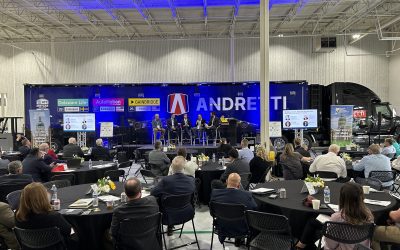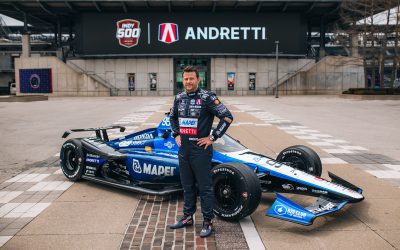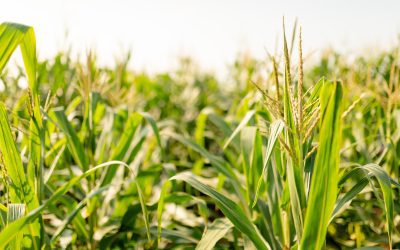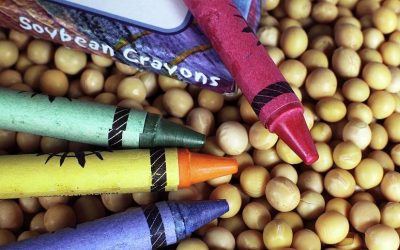What is the probability of meeting your spouse in a college statistics class? Not very high, but for Paul and Jennie Hodgen the odds were in their favor.
After meeting at Oklahoma State University, in statistics class, Jennie and Paul began their life together. They both graduated from Oklahoma State with masters’ degrees, and both pursued doctoral degrees at the University of Nebraska-Lincoln. Paul had a focus on agronomy and soil fertility throughout his college career, and Jennie focused on food science and meat science.
Upon graduation in Lincoln, Neb., and with higher education degrees in hand, they moved to St. Louis to begin their careers. After both being in the research field for a few years in their respective areas, they felt called to move back to Paul’s family farm in central Indiana in 2012.
Today, the Hodgens raise corn, soybeans, wheat, commercial cattle and a few 4-H animals on their farm in Putnam County. Through the years they have tried many different environmental stewardship programs, and some have stuck and some have not. Paul said keeping a longterm view on sustainability helps them stay on a conservation-minded path.
“We have adopted a lot of practices to reduce our impact on the environment without sacrificing yield or profitability,” Paul said. “Most of the practices and changes have helped increase and stabilize our yields since we have a very diverse climate in Indiana.”
Their farm uses no-till, strip-till and other tillage methods to keep the soil covered, when possible. The Hodgens said they don’t follow one specific practice. Since each field on their farm is different, they cater to each field to its unique needs. Their approach is an extended view toward sustainability, and they focus on practices that both keep the soil healthy and yields high.
Paul’s Advice? “Don’t be afraid to do something different, trial and error is key.”
Planting cover crops
The Hodgen farm works cover crops into their sustainability plan and has been planting cover crops in many forms for nearly 20 years. They keep their cover crops focused on their fragile soil, and once the cover crop has grown, they will move cattle to those cover cropped acres to graze. The cows enjoy cereal rye and oats the most, but they also get to try winter wheat. Letting the cattle graze on the cover crops has been a large cost-savings benefit for the Hodgens.
Paul said their cover cropping efforts take time and patience. They have flown cover cops on, and it’s been successful and unsuccessful. The same goes with putting them in the ground with a vertical tillage tool or a drill. “We’ve applied cover crops in every imaginable form,” Paul said.
Their family farm consists of a few families that work on and love the farm, so keeping it in good condition for the next generation is important to them. Continually being as safe as possible on their farm is also key. The Hodgens have a grain bin protocol to protect themselves and their employees, and they also no longer put on anhydrous ammonia due to safety hazards.
In the rolling hills of Putnam County, Paul and Jennie realized that certain parts of their farm just work better as pasture. So, they decided to increase the family’s beef cattle operation. Currently, they raise commercial beef they will sell at sale barns, and they have ramped up their freezer-beef processing. With Jennie’s doctorate degree in meat science – and that being one of her passions – they are committed to producing high quality animals through genetics and selective breeding.
Educating consumers
When asked about the future of their farm Paul stated that one of his biggest fears is that farmers and producers will begin to lose technology resources due to a lack of education with consumers. Jennie went on to say that there is a huge lack of information about agriculture getting to the consumer and consumers are constantly changing what they want or what they think is sustainable.

“How everyone does sustainability is different because each farm is different,” Jennie said.
The Hodgens realize that it is human nature for people to be apprehensive about what they don’t understand, but by working together to educate consumers on agricultural technology available, farmers and industry partners can create a stronger food system. With the right platform, Paul and Jennie believe there is a possibility to change some consumers’ views.
Paul serves on the Indiana Corn Marketing Council’s board of directors and is also a delegate for the U.S. Grains Council. Paul has seen many projects come through the state’s corn checkoff, like market development opportunities and ways to beef up the livestock sector in Indiana. But, Paul said his favorite part about being on the Council is seeing the projects come to life and watching how checkoff dollars spent nationally and internationally are returned back to Indiana farmers.
Going forward Jennie wants to encourage farmers that there is value in communicating with consumers, and there is power in using data to do that. Paul wants anyone thinking about sustainability to know that carbon credits could open new doors, and he believes there is untapped potential for agriculture in renewable energy resources in the future.
Paul and Jennie are both graduates of the Ag Leadership Program. Additionally, Jennie is a participating member of the following organizations: the U.S. Roundtable for Sustainable Beef, the U.S. Meat Export Federation Board, the American Meat Science Association and the U.S. Roundtable for Sustainable Poultry and Eggs.

Paul and Jennie have four children: Katie Jo, 11, Sidney, 9, Carlee, 6, and Ryan, 4. They farm in Hendricks, Montgomery, Parke, Putnam and Tippecanoe counties.



